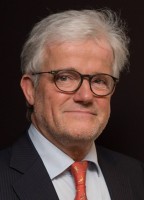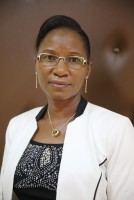45th Midi de la Microfinance et de l'inclusion financière

45a. Midi de la Microfinance et de l'inclusion financière
Inclusive finance versus terrorism: compliance, anti-money laundering and development
Photos de Olivier Minaire
For North-South cooperation against money laundering
The theme of this Midi will have definitely aroused a lot of interest, to note the many questions from professionals in the financial sector present in the room. On 10 October at Banque de Luxembourg, nearly 100 people attended the sensitive debate on inclusive finance in the face of terrorism, between the head of the largest microfinance institution in Burkina Faso and one of the 900 members of the Association Luxembourgeoise des Compliance Officers (ALCO).
Luxembourg highly regulated for the sending of funds
"Customers, investors, people with whom we have a business relationship... you have to know who you are working with before you can make transactions". This is how Sundhevy Debrand, an ALCO member and Compliance Officer at the investment bank Quilvest Luxembourg Services S.A., sets the context. The sending of funds from Luxembourg to different countries is highly regulated by European anti-money laundering directives transposed to Luxembourg, which also include the list of high-risk countries classified by the Financial Action Task Force (FATF), an intergovernmental organisation fighting money laundering and terrorist financing. Mrs. Debrand continues: "Faced with this list, the Luxembourg government has not taken a position; it is up to each professional in the financial sector to make its own risk-based approach, based on its own knowledge of the legal and regulatory framework of the country with which it will work. However, we know that in finance, there is no such thing as zero risk. However, it is possible to reduce the risk after two or three years of working with a country, when you know its local specificities well. Our role as compliance officer is to control the sending of funds to these countries, and this control depends above all on knowing the client".
Regulations applicable in the field, but at what cost?
"How are these regulations perceived on the Burkina side?" asked Luc Vandeweerd, the moderator of the debate, addressing Azaratou Sondo, Deputy Director in charge of the Network at the Faîtière des Caisses Populaires du Burkina (FCPB). "Since the creation of our umbrella company in 1972 to this day, the regulation has undergone a major evolution. We are now subject to instructions from the Central Bank and it is becoming increasingly difficult to carry out large volume transactions. We are required to report any transaction over CFAF 5 million - approximately €7,600 -. This permanent control can destabilize the customer and even damage our reputation".
While the binding aspect of compliance is highlighted in administrative terms, its cost does not facilitate its implementation either. "The cost of compliance is expensive", says Debrand. So who is responsible for this? "A field visit is at the institution's expense and can quickly reach significant amounts depending on the cost of the inspection and the financial sanctions applied, if any, continues Mrs. Debrand. Personally, we have to deal with it, replied Azaratou Sondo. Supporting the cost of compliance means setting up structures to absorb these costs, because we cannot charge this to our members".
Digital finance as an alternative to terrorism
Faced with terrorism in northeastern Burkina Faso, insecurity prevails and loan officers can no longer even travel to villages to meet members. So how can we continue to provide services in these fragile areas? "The solution is digital finance, says Mrs. Sondo. A national strategy is being developed to enable us to transfer money securely while pursuing our mission of poverty eradication. I am hopeful".
Strengthening North-South cooperation and dialogue
The closing remarks were given to Raymond Schadeck, President of Investing for Development SICAV, a microfinance investment fund based in Luxembourg. While for him compliance with European and Luxembourg legislation is very important, it obviously does not solve all the problems on the ground. "You have to do a good assessment between the risk and what you're trying to achieve," he adds. And above all, you need to surround yourself with partners who know the market well and who have the means to do the job. LMDF has been operating with ADA for 9 years. Together, they have created 115 partnerships in 26 countries. It is through a strong partnership that we will succeed not in avoiding the problem, but at least in preventing it".
According to Mr. Schadeck, microfinance institutions need to invest even more money, to better inform the public and their investors about the impact they are creating. "Talking about risk is important; but you have to balance all that; in 9 years, LMDF has disbursed 150,000 loans, which means they have changed the lives of 150,000 households! ».
Welcome address
- Banque de Luxembourg - Mrs Sarah Khabirpour, Head of Compliance
Speakers
- Mrs Azaratou Sondo, Deputy Director General in charge of the Network at the Faîtière des Caisses Populaires du Burkina (FCPB), Burkina Faso
- Mrs Sundhevy Debrand, member of the Association Luxembourgeoise des Compliance Officers (ALCO) and Chief Compliance Officer at Quilvest Luxembourg Services S.A.
Moderation
- Mr Luc Vandeweerd, Board member of ADA, Luxembourg
Closing remarks
- Mr Raymond Schadeck, President of Investing for Development SICAV, Luxembourg
Speakers of the Midi
Azaratou Sondo/Nignan, Deputy Director General in charge of the Network at the Faîtière des Caisses Populaires du Burkina (FCPB), Burkina Faso
Graduate of Higher Education at the Technical Institute of Banks in Paris, a Master in Sociology (rural sociology option) from the University of Ouagadougou, a Master in Business Communication from the African Institute of Management (IAM-Ouaga), a Master in Communication for Sustainable Human Development (IPERMIC, University of Ouagadougou). Mrs Sondo Azaratou started her professional career in 1996 in the "rural credit" component of the Sissili Rural Development Programme where she held the position of deputy project manager in charge of setting up village savings and credit cooperatives.
She returned to the FCPB in 1999 where from 1999 to August 2004 she was coordinator of the savings credit with education program at the Union Régionale des Caisses Populaires du Nord.
From September 2004 to June 2010, she was promoted to the position of Regional Director of the Caisses Populaires du Nord, where she was involved in the consolidation and development of the credit unions in the northern region.
From July 2010 to July 2015, she held the position of Marketing and Communication Director at the Faîtière des Caisses Populaires du Burkina where she was responsible for the development and coordination of the FCPB's business plans, marketing policies and communication strategies.
Since August 1, 2015, she has been appointed Deputy General Manager in charge of the Network at the Faîtière des Caisses Populaires du Burkina.
From 2002 to 2010, she was responsible for the Financial Innovation Centre's coordination and monitoring of new product development at FCPB.
She has been a director of CIF Assurance Vie Burkina since July 2014.
Since May 2017, she has been President of the Professional Association of Decentralized Financial Systems of Burkina Faso and Second Vice-President of the Federation of Professional Associations of Decentralized Financial Systems of WAEMU at the national and sub-regional level.
She was awarded the rank of Chevalier de l'Ordre National by the Burkinabe State in December 2015.
Mrs Sondo/Nignan Azaratou is 49 years old, married and mother of two children.
Sundhevy Debrand, member of the Association Luxembourgeoise des Compliance Officers (ALCO) and Chief Compliance Officer at Quilvest Luxembourg Services S.A., Luxembourg
Ms Sundhevy Debrand began her career in the financial sector in Luxembourg more than 20 years ago at Chase Manhattan Bank and quickly joined the internal control activities of various financial institutions such as Banca Intesa, Nikko Bank, HSBC, PayPal, Intertrust and Nordea where she expanded her skills in the Compliance function and the fight against money laundering and terrorist financing. Sundhevy currently works at Quilvest Private Equity where she is responsible for governance, compliance and prevention of money laundering and terrorist financing.
Since 2002, she has been a member of the Board of Directors of the Association Luxembourgeoise des Compliance Officers (ALCO) and is also a member of the Anti-Money Laundering Committee of the Association Luxembourgeoise des Fonds d'Investissement (ALFI).
Sarah Khabirpour, Head of Compliance at Banque de Luxembourg
After a six-year stint at the Ministry of Justice of the Grand Duchy of Luxembourg as an attorney, Sarah Khabirpour became Chief of Staff to the former Minister of Finance, Luc Frieden and Policy Advisor, from 2009 to 2014.
In the summer of 2014, she joined the BIL (Banque Internationale du Luxembourg) as Head of Strategy, Regulatory Affais and MarCom, where she also sits on the Board of Directors as a representative of the Luxembourg State.
She will then join the Banque de Luxembourg as Head of Compliance in September 2017, a position she still holds today.
Sarah Khabirpour holds a Master of Laws from the University of Paris I Sorbonne-Panthéon, and a Master of Laws (LL.M.) from the London School of Economics & Political Sciences. In 2014, she obtained an MBA in 'Executive Education - General Management Programme' from Harvard Business School in Boston (USA).
Sarah Khabirpour holds Luxembourg nationality. She also speaks German, French, English and Farsi.

Raymond Schadeck, Chairman of Investing for Development SICAV, Luxembourg
Born in 1955, Raymond Schadeck holds a Master's degree in economics (1979) and a law degree (1981) from the Louis Pasteur University in Strasbourg. Since 2012, he holds a certificate in corporate governance from INSEAD and is an INSEAD and ILA (Institut Luxembourgeois des Administrateurs) certified Director. Since July 2018, Raymond Schadeck acts also as Chairman of Investing for Development SICAV.
Mr Schadeck spent a large part of his career in the international audit and consulting firm Arthur Andersen (1981-2002). He then joined Ernst & Young as CEO until 2010. In 2010, he decided to leave the Ernst & Young network to devote himself entirely to a career as an independent director for Luxembourgish companies such as Luxexpo, Luxinnovation (until March 2018), Banque Raiffeisen, CDCL, SnapSwp, Minusines, Deveco, Intesa Sanpaolo Holding International and Private Equity International. Raymond is also the present Chairman of the Institut Luxembourgeois des Administraterus (ILA) and a Vice-chairman of Luxembourg’s Sustainability Council.
Mr Schadeck is chairing Up Foundation, is the Vice-chairman of EPI – Association luxembourgeoise pour l'Encouragement, la Promotion et l'Intégration sociale de jeunes et jeunes adultes en détresse –, member of the Board of Directors of EME – Ecouter pour Mieux s'Entendre – and of Equilibre. He was also a founding member of the "Et ass 5vir12" initiative, which was committed to a radical change in mentality within Luxembourgish society in the interest of future generations.
Luc Vandeweerd, Board member of ADA, Luxembourg
Luc Vandeweerd graduated in 1978 from the Université Catholique de Louvain de Belgique with a Masters in Social Communications. He worked at the International Labour Organisation (ILO) for twenty years as an expert in cooperatives and microfinance in various technical cooperation projects in Africa. From 1992 to 2002, M. Vandeweerd was based in Dakar, Senegal as head of the PASMEC project, a project to support the development of microfinance in West Africa led by the ILO in partnership with the Central Bank of Western African States – BCEAO. In 2002, he joined the management of ADA, a Luxembourgish NGO specialised in microfinance, until 2018, when he retired and joined the Board of ADA.




